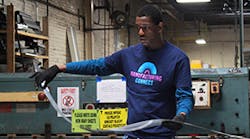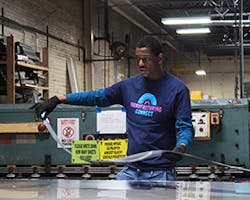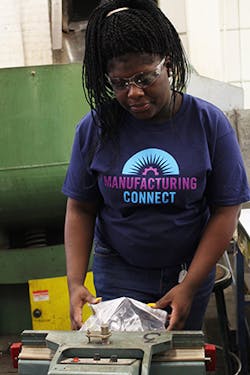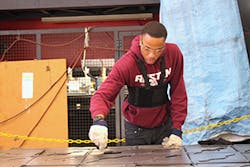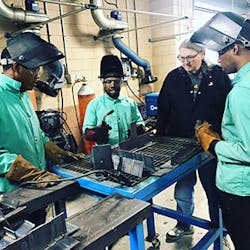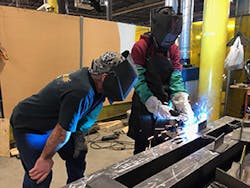Manufacturing workforce development: Opportunity knocks
How do manufacturers secure and develop reliable, long-term employees? They reconsider traditional employment requirements, train early, and hire locally. In their 2018 skills-gap study, Deloitte and The Manufacturing Institute found that “prioritizing competencies and potential in job candidates over strict adherence to sometimes arbitrary factors such as years of experience” could prove productive and even necessary in manufacturers’ quest to find needed talent.
A shortfall in skilled, trained employees could lead to missed market opportunities as well as a decrease in innovation and new product development, the study noted. Sixty percent of the manufacturer respondents said the top business impact of the skills gap was the “inability to maintain or increase productivity.”
The increasing use of automation, robotics, and artificial intelligence is creating a disparity between available workers and the skills needed to fill open jobs. Deloitte’s study found that employers want production workers with “extended computer skills to program a CNC machine for a new job or interact with CAD/CAM and other engineering or manufacturing software.” The study projects that if the industry does not close the skills gap, it could lose $2.5 trillion in economic output over the next decade.
“We need people who are interested in technology, engineering applications, and innovation,” says Colin Cosgrove, president of Laystrom Manufacturing, a precision sheet metal fabricator in Chicago.
Short-term measures to fill the gap—pay increases and bonuses—get people in the door but might not get them to stay. Outsourcing may increase productivity for the company, but employers are not developing high-quality, long-term employees within their plant.
Travis, a participant in the Manufacturing Connect program, shown during his spring break Internship at Chicago Metal Supply Inc.
Early investment, long-term success
To help address the skills shortage, manufacturers and educational institutions are focusing attention on collaborations that lead to skills certification in high schools and community colleges. The Manufacturing Institute offers a national list of high schools, community colleges, technical schools, and universities that allow students to earn NAM-endorsed manufacturing skills certifications.
And the effort to generate interest in and build qualifications for manufacturing careers in some locations starts even earlier. In California schools, for example, awareness building begins in elementary school, and CTE—career technical education—starts in middle school.
“Without seeing examples, kids don’t know what’s possible, what paths you can take in manufacturing,” says Cosgrove. “And there are many—In engineering, accounting, sales, production, project management.”
“I feel those who have benefited from the opportunities in manufacturing have a responsibility to communicate to high school students and young adults,” Cosgrove continues. “There are tremendous possibilities. I started making furniture parts on the shop floor when I was 16 years old. I moved up within different manufacturers, and now I lead this company.”
To tell his story and find good workers, Cosgrove works with Manufacturing Connect, part of the Manufacturing Renaissance organization in Chicago. Manufacturing Renaissance is described as a “national best-practice model” in manufacturing by The Century Foundation, a progressive public policy research institute.
“Until we introduce them to alternatives, the students want to do what they see on TV,” says Dee Dee Jones, industry coordinator for Manufacturing Connect. “They tell me, ‘I want to be a nurse, rap star, basketball player,’ ” she says, adding: “The students are not interested in manufacturing until we expose them to the day-to-day workings. Now they can see themselves as a computer engineer or plant manager, for example.”
Dasia, enrolled in the Austin College & Career Academy, during her job-shadow day at Laystrom Manufacturing.
Manufacturing Connect recruits companies to work with its program in area high schools. “We connect the community with the manufacturers seeking workers,” she says. “Until we brought in our program, the schools didn’t connect the graduates with jobs. Now our students graduate with certification, get jobs and cars. These kids have the hard skills, the technical skills to do the job right out of high school and make $18, $19 per hour.”
“We made our way into schools in lower-income neighborhoods where employers often overlook young hires,” Jones continues. Partners schools have up-to-date machine shops with both CNC and manual equipment. “We first train them in manual production so they see what is happening with the raw material and better understand, (and) then what the machine does and how to adjust it.”
Manufacturing Connect works with 100 manufacturers, and the program continues to grow—but not fast enough to keep up with growing industry demand. “We have 60 juniors and seniors and 100-plus freshmen and sophomores, half male and half female,” says Jones. “And the manufacturers typically request 10 graduates at a time.”
Freedman Seating, a leading manufacturer of transportation seating products, is located in Chicago’s Austin neighborhood, which has struggled with poverty, crime, and disinvestment. The area has one of the highest unemployment rates in Chicago, and Freedman Seating works closely with Manufacturing Connect.
Craig Freedman, CEO of Freedman Seating, says he strongly believes hiring within the community begins a cycle of success and has a positive economic effect as workers spend and stay in the area. Beyond hiring younger workers, Freedman’s company works with the Safer Foundation to hire people who were incarcerated and on work-release programs. Participating individuals have been screened for CNC training and are placed in jobs with manufacturers. The Safer Foundation provides housing and helps them adjust to life after prison.
“We don’t know their criminal record, and they are some of our best employees,” Freedman notes. “They want to do right. Granted, they are on probation when they start with us, but over three years, we have a 75% success rate with these workers.”
Oswaldo, a participant in the Manufacturing Connect program, during his job-shadow day at MATOT Inc.
Preparing workers to advance
Whatever their circumstances prior to being hired for a manufacturing role, workers who are new to industry often need to grow their “soft skills.” Deloitte’s report references a recent World Economic Forum study that found that human skills “such as critical thinking, creativity and originality, attention to detail, problem-solving and people management” will see an “outsized increase in demand relative to their current prominence.”
To meet that demand, high school graduates ages 18 to 28 now in their first jobs in manufacturing are invited to participate in the Young Manufacturers Association (YMA), a joint program with Manufacturing Connect. The YMA connects these workers with mentors them to help them flourish in their manufacturing careers. Participants hone their soft skills, work on leadership development, and learn how to be active community members. They also mentor high school students who are training in the machine shop.
“We help them see manufacturing as a career and a way out of poverty,” says Joshua Brooks, assistant program director in Manufacturing Connect. “Our case management includes retention intervention, individualized support services, and peer-to-peer support. We help them design pathways to management, to advance their skills, to move up in the company with professional training.”
YMA program participants on a visit to Chicago’s Daley College Manufacturing Technology and Engineering Center to take a tour and experience hands-on training.
YMA also exposes members to the structure of cooperatives and what it takes to own a company. Farther along in their career, participants may be able to engage with another key Manufacturing Renaissance program, Re/Cast, a partnership among Manufacturing Renaissance, and key government, foundation, labor, county, and private stakeholders. The purpose of Re/Cast is to arrange the acquisition of manufacturing companies through ownership succession by groups of employees and entrepreneurs, particularly women and minorities.
YMA also works with young adults who did not receive trades training in high school but are interested in opportunities in manufacturing. YMA places these young adults in paid training and internship programs in forklift training and a boot camp in OSHA regulation and compliance. For working adults up to 29 years of age, YMA offers training (without a stipend) to achieve a National Institute of Metal Working certificate as well as CNC training.
“I wanted a stable career,” says Torrell Hughes, 23, a participant in in TIG welding training. “I didn’t have an idea of how to do that. Now I feel more confident. The YMA members meet weekly or biweekly. We talk about the jobs available, offer information and support to help each other.”
“I get the word out about the YMA,” Hughes adds. “I try to play a part in influencing the minds of the high school students in the community. I want the same for them as I want for myself.”
The Manufacturing Connect program continues to grow, but not fast enough to keep up with industry demand.
With younger workers or the recently incarcerated, perhaps in their first job, Craig Freedman advises employers to be patient and flexible—to remember that one size does not fit all.
“As a company, you have to be trained and ready to have a workforce with diverse needs,” says Freedman “The supervisor needs to work with these hires and acclimate them to the company and culture.”
Deanna Nord, owner of Nord Strategy Group, is a writer, public speaker, and creative strategist. Contact her at [email protected].
Childcare, legal, finance, transportation, and housing challenges can make it harder for workers to get and/or keep a job. Today, many manufacturers in Chicagoland work with Retention Plus, an organization that provides on-site coaching in the workplace to help employees address their financial health, locate childcare subsidies, and generally help problem-solve in crucial areas that impact a person’s employment. (Retention Plus is part of OAI Inc., an organization that offers services to manufacturers and their workforce in Chicago’s south suburbs.)
“If someone screws up, the first time around we will not disqualify them,” says Freedman. “Everyone deserves a second chance.”
